Since 2010, January has been dedicated to raising awareness about human trafficking. Month-long campaigns help educate the public about how to identify and prevent human trafficking in the U.S. and around the world. For Grace Farms, combatting human trafficking is a year-long endeavor. Since its inception in 2015, Grace Farms has convened leaders from across the public and private sectors to address human trafficking and other injustices including wildlife trafficking, forced labor, and gender-based violence. In addition, our in-house expertise is used to build law enforcement capacity and advocate for policies for protection and prevention locally and globally.
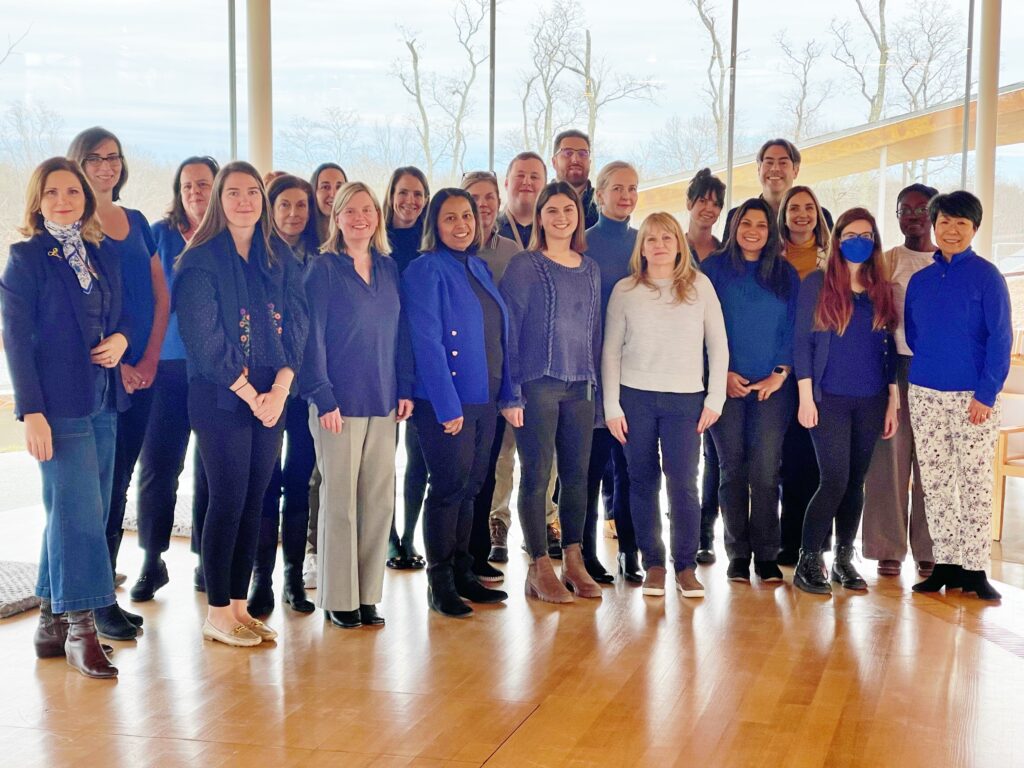
Team members from Grace Farms came together to support the month-long national “Blue Campaign” to raise awareness about human trafficking. The campaign is part of the U.S. Department of Homeland Security’s public-awareness efforts to combat human trafficking. Photo credit by Grace Farms Foundation
“By bringing together law enforcement, NGOs, and the private sector to form strategic partnerships, we are forging innovative pathways to combat modern slavery, gender-based violence, and environmental crimes.” – Rod Khattabi, Chief Accountability Officer & Justice Initiative Director
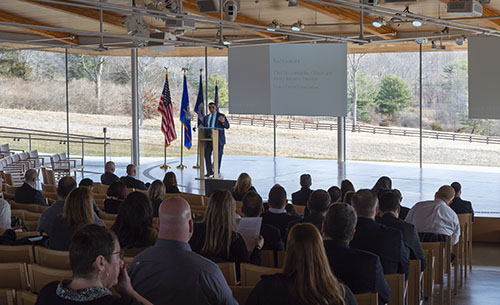
Grace Farms’ Justice Initiative, led by Rod Khattabi (podium), convenes leaders and experts from across the public and private sectors, to address modern slavery. Many of these events are held in the award-winning River building’s Sanctuary that overlooks expansive meadows and woodlands. Photo credit by Kyle Norton
What Is Human Trafficking?
This term includes forced labor, debt bondage, forced marriage, and human trafficking. Human trafficking or trafficking in persons as defined by the Trafficking Victims Protection Act of 2000 includes:[1]
- sex trafficking in which a commercial sex act is induced by force, fraud, or coercion, or in which the person induced to perform such an act has not attained 18 years of age; or
- the recruitment, harboring, transportation, provision, or obtaining of a person for labor or services, through the use of force, fraud, or coercion for the purpose of subjection to involuntary servitude, peonage, debt bondage, or slavery
- sex trafficking in which a commercial sex act is induced by force, fraud, or coercion, or in which the person induced to perform such an act has not attained 18 years of age; or
- the recruitment, harboring, transportation, provision, or obtaining of a person for labor or services, through the use of force, fraud, or coercion for the purpose of subjection to involuntary servitude, peonage, debt bondage, or slavery.
Perhaps another way to better understand the issue is to listen to individuals and organizations that are working to disrupt these criminal activities. In 2016, Grace Farms convened a two-day workshop with leading experts from Grace Farms, not-for-profits, and other sectors. The recommendations were published in a report “Fighting Human Trafficking in Conflict: 10 Ideas for Action by the United Nations Security Council,” and presented on September 8, 2016 at the United Nations Headquarters in New York City. This short video, a compilation of the highlights over the two days, addresses the challenges as well as solutions.
“These acts of cruelty and evil will not stop unless we intervene.” – Sharon Prince, CEO and Founder, Grace Farms Foundation
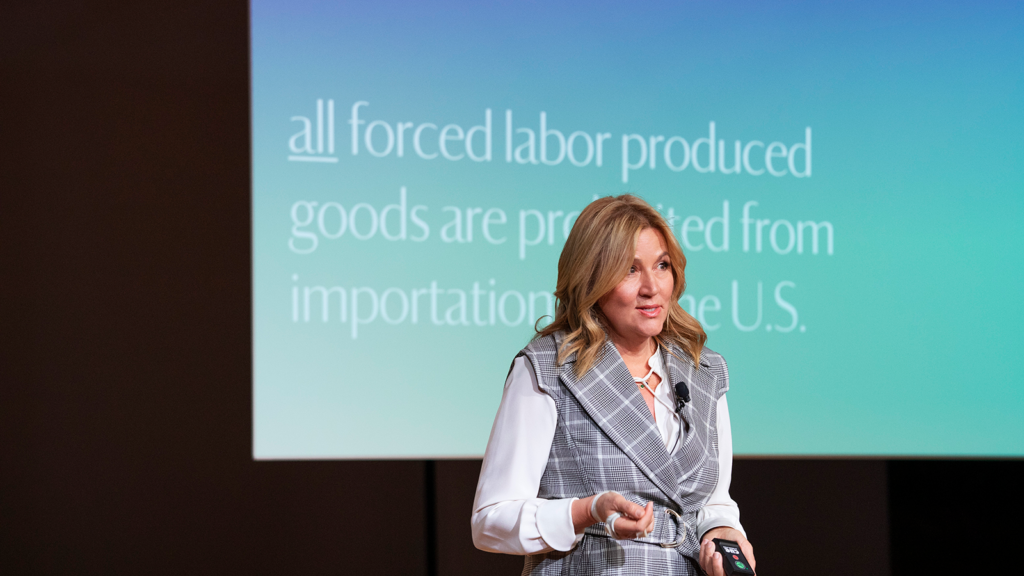
Sharon Prince initiated Design for Freedom, a global movement to remove forced labor from the built environment. Since its launch in October 2020, with a groundbreaking report and dedicated website, more than 80 industry leaders have joined the movement. There are currently about 28 million held in forced labor around the world.
What Is the Scope of Modern Slavery?
On any given day, about 50 million people around the world are in some form of slavery.[2] “And the challenge of modern slavery appears to be growing. Millions of additional people – women, men, girls and boys – have fallen victim to forced labour and forced marriage in recent years.”
- 49.6 million people were living in modern slavery in 2021, of which 27.6 million were in forced labour and 22 million in forced marriage.
- Of the 27.6 million people in forced labour, 17.3 million are exploited in the private sector; 6.3 million in forced commercial sexual exploitation, and 3.9 million in forced labour imposed by state.
These are staggering statistics to comprehend. A recent report, the Global Estimates of Modern Slavery: Forced Labour and Forced Marriage, puts this humanitarian crises into perspective with real stories from the field ranging from trafficking to debt bondage.
Take this young boy that spent his entire life trying to repay his borrower with what began with a small loan. “When he was only 16, Ran, now in his eighties, took a $20 loan from a landowner. To repay his debt, he ploughed the landowner’s field for years until his government freed him. For years, the fruit of his labour belonged to someone else. He couldn’t leave, he couldn’t rest, he couldn’t stop. He was in bonded labour.”[3]
Bianca, who was taken from her village when she was 16 years old, was “sold five times before arriving in a nearby country, where she was kept behind bars and made to work as a prostitute.” When she became pregnant, she was fortunate to escape to a shelter, where she had her baby, Anne-Marie.
What Is the Extent of Trafficking Online?
There are millions of stories like Ran and Bianca and the pandemic and use of social media by traffickers – who are increasingly becoming more and more sophisticated – have resulted a surge of online trafficking that will be discussed during the Grace Farms’ events. In the U.S. alone, about 40% of sex trafficking victims are recruited online, according to UN News.[4]
“Human traffickers who trick people with fake job offers and promises and then exploit them for profit, are taking advantage of online technologies for every step of their criminal activities.”
Traffickers, for instance, will create fake websites or post advertisements on legitimate employment portals and social networking websites to find potential victims. But governments and not-for-profits are devising ways to fight back. For instance, Seattle Against Slavery, created a campaign that resulted in a 50% decline in online searches for keywords such as “teen escort” over a two-year period.[5]
During this period, the not-for-profit posted fake online adverts that connected people with chatbots that posed as sex workers. The chatbots delivered a “deterrence message.” The campaign also involved placing online warnings about the risks of buying sex online, which led to a 50% decline in online searches for keywords such as “teen escort.”
What Are Forms of Prevention?
While there are organizations focused on helping survivors, Grace Farms is dedicated to disrupting all forms of modern slavery through prevention. The Justice Initiative, led by Rod Khattabi, has spent his career in federal law enforcement where he developed expertise in investigating and helping to prosecute international organized crimes, including international and domestic human trafficking, child exploitation, export violations, narcotics, terrorism, complex financial crimes, money laundering, international weapons trafficking, intellectual property, export, and immigration.
Over the years, Rod has formed dozens of public-private partnerships locally and internationally to advance the work of the Justice Initiative and Grace Farms. The organizations include the U.S. Department of Homeland Security, U.S. Department of State, U.S. Customs and Border Protection, and not-for-profits such as Liberty Shared and Lusaka Agreement Task Force. Around the world, Grace Farms trains law enforcement in intelligence gathering, investigative techniques, and asset seizures that help fund future investigations.
In addition to building capacity, Grace Farms brings together hundreds of federal law enforcement officials from federal, state, and local agencies to share information and best practices. Grace Farms also hosts public events to raise awareness about human trafficking. For these efforts, locally and internationally, Grace Farms has been recognized for this work. In 2022, for instance, it was honored by Homeland Security Investigations (HSI) New York with the Private Sector Partnership Award. The award recognizes extraordinary efforts by private sector individuals and/or organizations that work with HSI New York to identify systemic vulnerabilities in cyber, finance, trade, and travel, helping to address those vulnerabilities.
“The public-private partnership is the most promising model for achieving substantive results in disrupting transnational organized crime syndicates involved in modern slavery and wildlife trafficking.” – Rod Khattabi.
How Can a Victim Find Help?
National Human Trafficking Hotline (U.S.)
1 (888) 373-7888
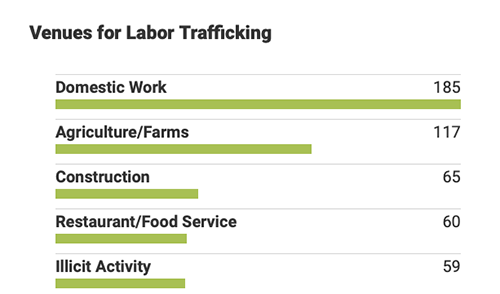
Of the labor trafficking reported on the national (U.S.) hotline above, here are the top five venues for labor trafficking. Below are the top five venues involving sex trafficking reported by the National Human Trafficking Hotline. Source: National Human Trafficking Hotline
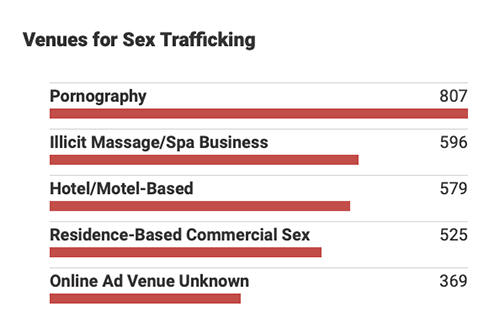
National Human Trafficking Referral Directory
There is also an online Referral Directory that is made up of anti-trafficking organizations and programs that offer emergency, transitional, or long-term services to victims, and survivors of human trafficking. By typing in a zip code, users can find help in their area.
People can also report tips about sex trafficking and labor trafficking by calling the Hotline.
International Hotlines and Resources
Here is a list of international hotline numbers from La Strada International, a European NGO platform against human trafficking.
__________________________________________________
Learn More About Grace Farms
Grace Farms Foundation’s interdisciplinary humanitarian mission is to pursue peace through five initiatives — nature, arts, justice, community, and faith — and Grace Farms, a SANAA-designed site for convening people across sectors. Our stake in the ground is to end modern slavery and gender-based violence, and create more grace and peace in our local and global communities.
Subscribe to our newsletter and follow us on social media @GraceFarmsCT for news, stories, and updates about our place and initiatives.
_______________________________________________
[1] “Trafficking in Persons Report,” U.S. Department of State. 2022
[2] “Global Estimates of Modern Slavery, Forced labour, modern slavery and human trafficking,” International Labour Organization (ILO), Walk Free, and International Organization for Migration (IOM). September 2022.
[3] “Global Estimates of Modern Slavery, Forced labour, modern slavery and human trafficking,” International Labour Organization (ILO), Walk Free, and International Organization for Migration (IOM). September 2022.
[4] “Traffickers abusing online technology, UN crime prevention agency warns,” UN News. October 31, 2021.
[5] “Trafficking industry hit as ‘sex worker’ chatbots fool thousands,” The Guardian. February 13, 202o.

